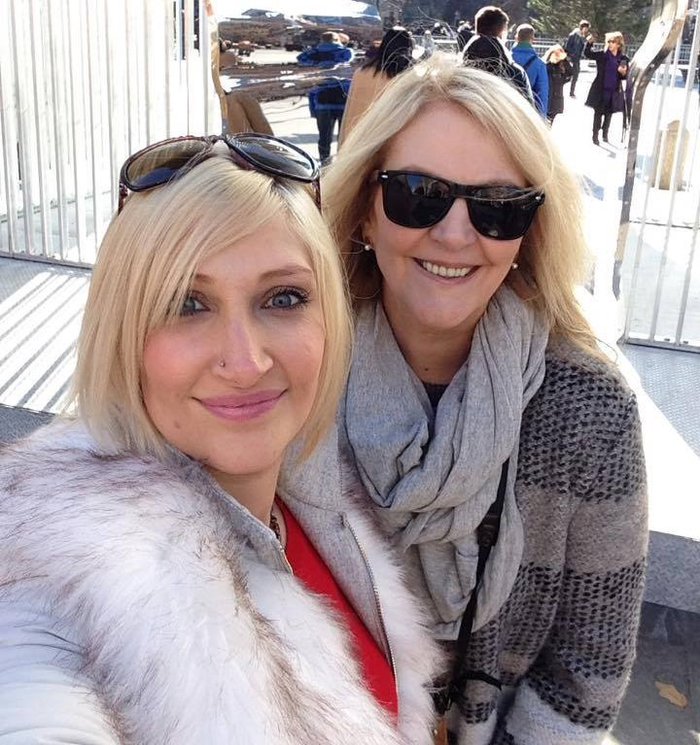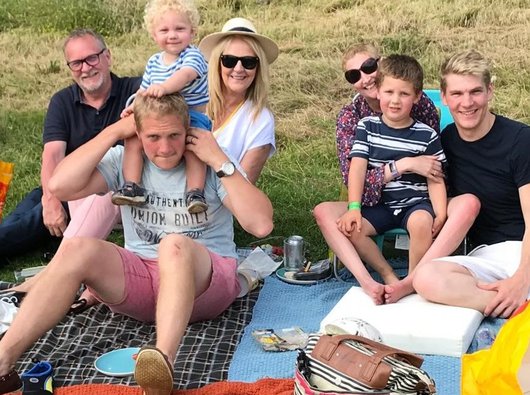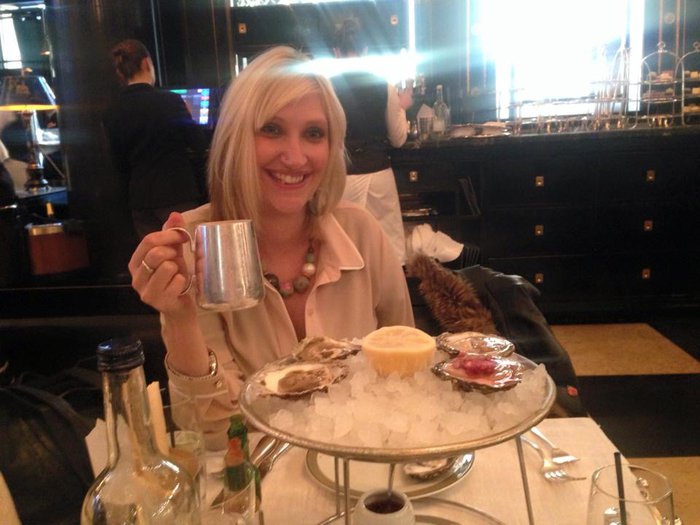The chance to say it all
Christine lost her daughter Charlotte to blood cancer when Charlotte was 32. Christine talks about the importance of asking questions, saying what’s on your mind and trying to accept you’ve done all you can.

Please read on only if you wish to know about someone's experience of loss. Remember that no two people are the same, even if they have the same diagnosis. Everyone has a different story.
It started when we were in New York celebrating Charlotte’s 30th birthday and my 60th. She complained of a sore throat, but we didn’t consider it to be anything sinister. It never entered our heads. But the sore throat went on for the longest time. I suggested Charlotte go and see her GP who sent her to the local hospital.
It took a long time to get a diagnosis. At various times they said it was lymphoma, Epstein Barr virus or HLH (hemophagocytic lymphohistiocytosis). Charlotte had bone cancer as a child and we were told then she couldn’t have chemotherapy – that was why she had to have her arm amputated when she was seven years old. So we dreaded anything that needed chemotherapy.
She was treated with steroids and a drug called rituximab. When she came off the steroids she was very weak. We had to carry her and feed her, but she got better and it seemed she was cured for a while. But then she got really bad pains in her stomach.
A blood cancer diagnosis
More tests were done and, finally, we were told Charlotte had blood cancer – a type of non-Hodgkin lymphoma. There was a big mass of it in her stomach. She had to have chemotherapy, and that did put her into remission for three or four weeks. But it came back.
One of Charlotte’s brothers was a good match for her as a stem cell donor, but when she was told about the difficulties and risks it would mean for her, she was dissuaded from that route, and she didn’t have enough healthy stem cells for a transplant using her own cells. So more chemotherapy was the only option left. But Charlotte said no.
Of course, we were devastated and did not want her to stop treatment, but we did understand. I’d already seen my mother and sister die from cancer and to me, some things are worse than dying. Charlotte said exactly what she thought about it and the consultant accepted her decision. She didn’t want to die in hospital, so she came home and she was with us for two more months.
I told Charlotte she’d have the best funeral, and she said, “But I won’t be there.” So, we organised a “gathering” for her. There must have been 60 people in the apartment.
They all knew she was dying, and Charlotte told everyone they could bring a bottle but leave sadness at the door.
We asked people to write down any stories they might have about how they met Charlotte, and anything else they might like to say.
These letters brought Charlotte (and us) so much joy later when she read them. I will be forever grateful that we were able to do the gathering. It was the most deeply moving and rewarding event – not just for Charlotte and all of the family but for everyone who attended.
Charlotte had guts but she didn’t shout about it.
She never let the fact she had one arm stop her doing anything. If her brothers were doing something adventurous, she wanted to do it too. And she did. She just got on with things quietly.
She worked in a male youth offenders’ prison in Yorkshire. Although she stood at just five foot two with one arm, those huge lads hung on her every word. We worked together at the prison one time on a project, and it was amazing to see her in action. She was tough with them, but she cared. And she had a great sense of humour.
Christine and family on a picnic with Charlotte after she became ill

Honest communication
Nothing can make a situation like this feel any better, but honest communication with the hospital staff and your loved one might make a difference to you later on.
It took time, but we did develop a good relationship with the consultant who was in charge of Charlotte’s care. At first, Charlotte felt he was lying to her – he was just trying to be gentle, but she wanted the truth. We were both very direct with him.
I said to him once, “You must feel like hiding behind the desk when we come in.” But he said no, it was refreshing. If you look at it from their point of view, sometimes they may have something to say, but they’re not sure you want to know.
If you ask the question yourself, then they know you want the answer.
Most of the NHS staff were fantastic, but some were unhelpful. For example, one nursing sister told me off for questioning the consultant, almost suggesting that I was being over-protective. It could have knocked my confidence, but I couldn’t let a snide remark deter me from doing my best for my daughter.
I drove Charlotte to every appointment. I would ask if she wanted me to come in, and she always said yes. Before we went in, we would discuss the outcome she wanted from the meeting so we wouldn’t get thrown off and come out not finding out what she wanted to know. If Charlotte had something to say but told me she was frightened of saying it, I would say it for her.
Approaches to grief
I know timing is everything, and I don't bring this up lightly. Nothing can take the pain away but, in time, there are things you can do to ease your feelings.
Charlotte, each day, right until the day she died, wrote three things in her diary that she was grateful for. There’s been a lot of talk about gratitude, and people roll their eyes a little bit. But I say, don’t roll your eyes until you've tried it! There is always something to be grateful for.
I know it is often difficult, but I also think it’s very important to try to be absolutely open and honest about what you are thinking and feeling.
Not necessarily looking for answers or fixing things – just being able to say things out loud. I don't think many people do that.
Family members can react differently to grief and deal with it in their own way. In day-to-day life, it’s difficult to find opportunities to sit down and talk about the person you’ve lost. So, on occasions such as the anniversary of Charlotte’s death or her birthday we get together and go somewhere that meant something to her. For example, on her birthday we go back to the Wolseley where she loved to eat oysters. The family go together, we eat oysters, we talk about her. And it helps.

You may find that friends don’t talk about what’s happened because they don’t want to upset you. Well, I’m upset all the time, and I cry every day!
I think it’s worse not talking about it at all. We lost a few friends who couldn’t cope and just started avoiding us, but thankfully, most have stayed the course.
Some things I've learned
If I could give any advice to someone who’s been told their loved one is terminally ill, I would say this:
- Keep asking questions Make sure you understand exactly what’s happening and why. It may not make you feel any better at the time, but your loved one could be faced with some very difficult decisions and to help them do that, you need to be sure you have all the facts.
- Read reliable information That helps you know what questions to ask. But get your information from trustworthy sources like hospitals and charities, not Wikipedia.
- Try to accept what’s happening It is not easy, but if you are in denial, how can you help?
- Say what’s on your mind If there's any silver lining to terminal blood cancer, it gives you the opportunity to say and do the things with your loved one that you probably wouldn't have said or done otherwise. The chance to say it all.
If you would like to talk to someone about a terminal prognosis, or have lost a loved one to blood cancer, please contact our Support Service on 0808 2080 888 or [email protected]
